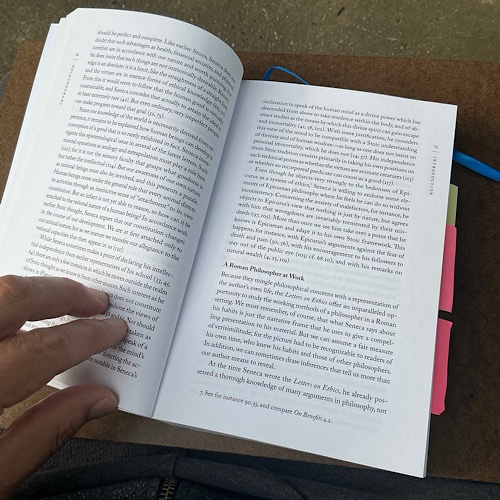As the Island of Knowledge grows, so do the shores of our ignorance—the boundary between the known and unknown. Learning more about the world doesn’t lead to a point closer to a final destination—whose existence is nothing but a hopeful assumption anyways—but to more questions and mysteries. The more we know, the more exposed we are to our ignorance, and the more we know to ask.
~ Marcelo Gleiser
It feels as if everything I know is fractal! Things are complicated by the fact that everything I discover, read, and learn creates a network of connections in my knowledge. I’m always trying to get enough perspective to see where that network is inbred; I’m always looking for ways to break out of my knowledge bubble. But sometimes, the knowledge bubble can be used to make manageable a task that would otherwise be impossibly large.
Consider the writings of Lucius Annaeus Seneca, known as Seneca the Younger, or most often just written as Seneca. Even just his series of letters to a student make for a 500 page tome. Worse, there are notes, references and multiple very different translations into English. As an example of the complexity, consider these translations of a small excerpt from letter 42. (There are 124 letters plus some additional fragments.)
So, concerning the things we pursue, and for which we vigorously exert ourselves, we owe this consideration—either there is nothing useful in them, or most aren’t useful. Some of them are superfluous, while others aren’t worth that much. But we don’t discern this and see them as free, when they cost us dearly.
~ Holiday and Hanselman from, The Daily Stoic, p75.
If I’m correctly understanding their notes, that’s their translation from the original Greek and Latin texts. I find this translation frequently on the Internet, sometimes crediting those authors/that book, and sometimes crediting, Seneca, Moral Letters, 42.6.
Next, this is from Richard Mott Gummere. My limited digging suggests his original work was published in 1917. I’m guessing it went out of copyright in 2017, because it’s pretty easy to find it entirely republished. (Search for “Seneca Richard Mott Gummere”.) The copy I have is a crappy version from Barnes and Noble. (It’s as if they printed the book at 50% oppactiy.) Gummere titled letter 42, “On Values.” (Seneca did not title them, he simply wrote letter after letter after letter to his student.)
Therefore, with regard to the objects which we pursue, and for which we strive with great effort, we should note this truth; either there is nothing desirable in them, or the undesirable is preponderant. Some objects are superfluous; others are not worth the price we pay for them. But we do not see this clearly, and we regard things as free gifts when they really cost us very dear.
~ Seneca, 42.6, translated by Richard Mott Gummere
Finally, here’s the rendering from a very new publication from Chicago Press, which—again if I’m interpreting things correctly—takes as its primary sources translations from 9 different authors, (including Gummere,) published between 1914 and 2010. The same section is presented with letter 42 titled in the Table of Contents as, “Good People are Rare.” (But the letters in the body of the text are not presented with their titles—recall, Seneca didn’t title them.) Interestingly, I cannot find the following text anywhere on the Internet, the book only having been published in 2015 may be the reason.
This indeed is a point we should keep in view. Those things we compete for—the things to which we devote so much effort—offer us either no advantage, or greater disadvantage. Some are superfluities; others are not worth the trouble, but we don’t realize it. We think things come for free, when in fact their price is very steep.
~ Seneca, 42.6, and translated by Margaret Graver and A.A. Long
As the length of this blog post attests: What starts simply as, “I’d like to read some of Seneca’s writing,” quickly gets complicated. Frankly, it gets impossibly complicated. Impossible as in: Never mind, I don’t have time for this. But I do want to read some of Seneca’s writing. (I have already read many of his letters.)
So my current plan is to use my collection of Seneca quotes to choose which letters to read again and more thoroughly. Thanks to the Internet, I can find the source letter given a snippette of text. Then I can enjoy the letter using my exquisite University of Chicago Press translation, which is magnificently annotated.
ɕ

